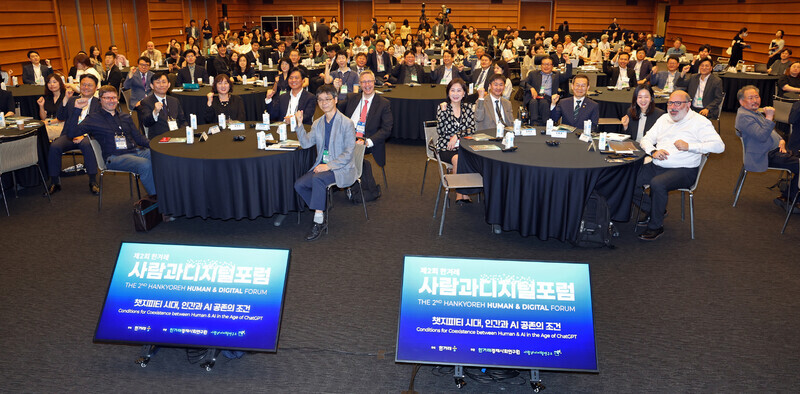hankyoreh
Links to other country sites 다른 나라 사이트 링크
Unexpected rate of AI development requires timely discussion of side effects

Is it okay to let generative artificial intelligence (AI) chatbots keep producing responses with the subject “I”? If AI can detect cancer, would radiology technicians no longer be needed? What kind of new skills should children who will be living in the age of AI obtain?
The topic of the second Hankyoreh Human & Digital Forum, which took place at the international conference hall in the Korea Chamber of Commerce and Industry building in the Jung District of Seoul on Friday with the Hankyoreh as its host, was “Conditions for Coexistence between Human and AI in the Age of ChatGPT.” While anticipating the birth of opportunities unforeseen in various fields thanks to AI technology, experts agreed on the urgent need for discussion to prevent the potential side effects of technology advancing at a speed that exceeds expectations.
Yoon Songyee, the president and chief strategy officer of NCSOFT, gave a lecture titled “The Great Transition of Civilization: Lead to More Human-Centric Lives,” during which she voiced concern about AI bias, saying, “Most major AI models were trained and developed based on data generated by US companies in North America, and the more specific countries take the lead in developing major AI models, the more we will see outcomes that harbor the biases, worldview, and values held by those very countries.”
She continued, “Governments and corporations should cooperate by balancing appropriate regulations and innovation so that [AI] can be used as a tool for cultural coexistence and harmony without causing cultural colonialism.”
James Landay, the co-founder and vice director of the Institute for Human-Centered AI at Stanford University, emphasized that AI should be used to strengthen human capabilities rather than to substitute humans. “Not only computer scientists and engineers but also sociologists, anthropologists, legal experts and health care workers should all participate and start discussing how to design human-centered AI,” he said.
Brooklyn Law School professor Frank Pasquale argued that AI should be prohibited from acts reproducing humanity, such as using emojis and figures of speech referring to itself, in order to minimize confusion entailing the advancement of AI. “We need to carefully document the sources of the data used for training AI models and ensure that AI-generated images are properly labeled or otherwise watermarked as such,” the professor said. “If we apply these new rules to the generative AI field, it’ll help us prevent various possible negative side effects.”
Also participating in the forum were Minister of Science and ICT Lee Jong-ho; Koh Jean, the chairperson of the Presidential Committee on the Digital Platform Government; and two members of the National Assembly’s Science, ICT, Broadcasting and Communications Committee: Her Eun-a of the People Power Party, and Jo Seong-lae of the Democratic Party. A total of around 250 people took part in the day’s forum, including domestic and international academics, IT workers, and members of the general public.
In his welcoming address, Lee Jong-ho said he would “listen closely to today’s discussions and make active reference to them in policy pursuits.”
Koh remarked, “I’ve given a lot of consideration to how to make use of AI and big data to increase productivity and the quality of service to the Korean people. I will do my best to create a foundation for the use of AI in a variety of fields as a positive technology that contributes to humankind.”
Hosted by the Hankyoreh Media Group, the Hankyoreh Human & Digital Forum is held annually in June to discuss the human-centered digital transition and issues and side effects of the acceleration of Big Tech and platforms, and to explore alternatives.
By Chung In-seon, staff reporter; Kwack Jung-soo, Hankyoreh Economy & Society Research Institute senior staff writer
Please direct questions or comments to [english@hani.co.kr]

Editorial・opinion
![[Editorial] Intensifying US-China rivalry means Seoul must address uncertainty with Beijing sooner than later [Editorial] Intensifying US-China rivalry means Seoul must address uncertainty with Beijing sooner than later](https://flexible.img.hani.co.kr/flexible/normal/500/300/imgdb/original/2024/0517/8117159322045222.jpg) [Editorial] Intensifying US-China rivalry means Seoul must address uncertainty with Beijing sooner than later
[Editorial] Intensifying US-China rivalry means Seoul must address uncertainty with Beijing sooner than later![[Column] When ‘fairness’ means hate and violence [Column] When ‘fairness’ means hate and violence](https://flexible.img.hani.co.kr/flexible/normal/500/300/imgdb/original/2024/0516/7417158465908824.jpg) [Column] When ‘fairness’ means hate and violence
[Column] When ‘fairness’ means hate and violence- [Editorial] Yoon must stop abusing authority to shield himself from investigation
- [Column] US troop withdrawal from Korea could be the Acheson Line all over
- [Column] How to win back readers who’ve turned to YouTube for news
- [Column] Welcome to the president’s pity party
- [Editorial] Korea must respond firmly to Japan’s attempt to usurp Line
- [Editorial] Transfers of prosecutors investigating Korea’s first lady send chilling message
- [Column] Will Seoul’s ties with Moscow really recover on their own?
- [Column] Samsung’s ‘lost decade’ and Lee Jae-yong’s mismatched chopsticks
Most viewed articles
- 1Xi, Putin ‘oppose acts of military intimidation’ against N. Korea by US in joint statement
- 2For new generation of Chinese artists, discontent is disobedience
- 3[Editorial] Transfers of prosecutors investigating Korea’s first lady send chilling message
- 4[Editorial] Intensifying US-China rivalry means Seoul must address uncertainty with Beijing sooner t
- 5[Column] When ‘fairness’ means hate and violence
- 6How K-pop broke the internet — and broke into the US market
- 7[Column] How to win back readers who’ve turned to YouTube for news
- 8AI is catching up with humans at a ‘shocking’ rate
- 9[Editorial] Yoon must stop abusing authority to shield himself from investigation
- 10‘Shot, stabbed, piled on a truck’: Mystery of missing dead at Gwangju Prison